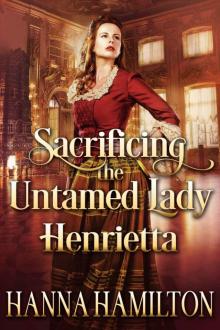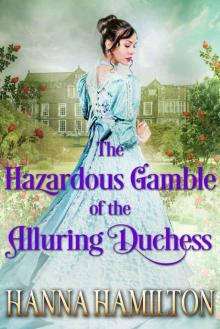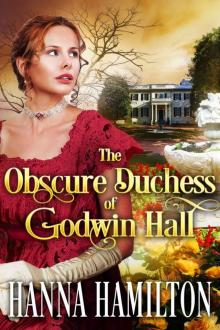- Home
- Hamilton, Hanna
The Obscure Duchess of Godwin Hall: A Historical Regency Romance Novel Page 12
The Obscure Duchess of Godwin Hall: A Historical Regency Romance Novel Read online
Page 12
“I suppose these ailments can seem rather sudden and violent, can they not?” Caroline turned to Rebecca in an expression of desperation. “Surely it does not signify that there is anything to fear?”
Rebecca found some space in her shock to feel pity for Caroline. Caroline’s whole family had been carried off by a variety of sudden illnesses through her childhood and early years, and Rebecca suspected that this sudden attack of Charles’ was bringing back a great deal of frightening memories.
“I am sure that there is nothing to fear,” Rebecca said, reaching out to touch her friend’s arm.
There was a flurry of activity and noise in the entrance hall as the doctor arrived. This time his demeanor was entirely different - completely quiet and businesslike, without a hint of the slightly patronizing reassurance that he had displayed earlier.
He made swift progress up the main staircase and followed a manservant to the main gallery where the master bedrooms were. Grandmamma Horatia was not far behind him, seeming to glide along despite her usually slightly awkward gait.
After hesitating for a moment, Rebecca followed on, Caroline with her. As sure as she was that it was not proper for her to enter Charles’ room, and as little as she wanted to play nurse to him if he was not as sick as he claimed, she had a strong feeling that she needed to see the situation for herself.
The result was not what she was expecting.
At first from the doorway, she could only see the doctor bending over the bed to take the patient’s pulse, but she heard Grandmamma Horatia’s muffled gasp of horror. When the doctor stepped away, she caught sight of Charles lying on the bed, his face so waxen that it could scarcely be distinguished from the white bed linen.
“Oh Charles,” she heard a voice whisper in horror, but it was only belatedly that she realized it was her own voice.
A rush of feeling overwhelmed her. Suddenly, the Charles that she had been dreading marrying evaporated, and there was only Charles her childhood friend, Charles the brother-substitute. Charles, one of the few people who had alleviated her otherwise terribly lonely childhood.
“My dear…” she rushed to his bedside and took the hand that Grandmamma Horatia was already holding. A small part of her expected him to open his eyes and say something flippant or crude.
But no such comment came. Instead, he drew in a single, wheezing breath, as though it cost him a great deal.
“Rebecca,” he said, and with a great deal of effort, he squeezed the hand within his.
“You needn’t talk, Charles,” she said, her fear mingling with discomfort. “You needn’t use up all your strength.”
“Why not?” He laughed, and the laugh contained a horrible, bubbling sound. “I might as well use it up on something.”
She smiled as if by smiling she could do away with the implications of his words.
“If you did not want to marry me, Rebecca,” Charles continued, apparently struggling to get each word out, “Then you might have just said so.”
Rebecca made no reply. In truth, she had not the faintest idea of what he was referring to.
“Is he delirious, doctor?” she asked, looking up at the aforementioned gentleman in concern. The doctor frowned back.
“Not as far as I can discern.”
“My mind is perfectly sound,” Charles said. His words were ragged and corrupted and seemed to cost him more effort with every syllable.
“It’s a pity I do not have a will,” he said. “Although I suppose everything will go to Andrew.”
“Will?” Rebecca echoed in horror, suddenly grasping what he was getting at. “Do not be absurd, Charles, there is no need for anyone to have a will at present.” There was something of the younger sister in her voice as if she were reprimanding her brother for a piece of boorish behavior.
“Is that so?” Charles drew in a terrible, rattling breath. “You know, Rebecca, if you had waited until…” there was another dreadful thin breath in and out, “After we had married then you should have got some of the money… as my widow… perhaps… the idea of being my wife… even briefly… was too repulsive to you.”
There was no accusation on his face, only sadness.
Only now was Rebecca starting to fully understand what he was saying.
“Charles, you cannot possibly believe that I have done this to you,” she said. She felt as though she might drop into a faint, or fade away from the horror of it.
“Charles dear, I do not believe that you are in your right mind,” Grandmamma Horatia said. Rebecca could tell from the tremble in her voice that she was frightened, but even now she maintained some of her characteristic stern authority. “Rebecca did not do this to you, of that I have every faith.”
Charles either did not hear or pretended not to hear.
“You needn’t deny it… Rebecca,” he said. “I was only going to tell you… that I forgive you. I am sorry… that you hated the idea… of being married to me… so much.”
Rebecca opened her mouth, but she could not find a single sentence that would express what she was feeling, so she shut it again.
It was plain to her that Charles was dying, even though he was clearly wrong about the reason.
Her assessment of this fact might have seemed dispassionate, but that was only because it was as if all the authentic feeling had been pulled out of her, leaving only a hollow sense of shock.
Even in her darkest moments, she had never wished Charles any harm. The fact was that the idea of wishing him harm had not even occurred to her. Though she had known that people died from time to time, she had never encountered the death of a healthy young man of four-and-six. She could not even have conceived of such a thing, much less wished for it.
“Charles…” she said again. Her voice was quite as croaking as his. She too felt as if the life was draining from her. “Charles, what you are saying does not make any sense.”
“You… needn’t… lie…” he replied. “I… forgive you…”
And then he became very still.
Somehow it did not occur to Rebecca that he had died. She could see the doctor shaking his head. She could see Grandmamma Horatia’s face, quite ashen with shock. She was even dimly aware of Caroline bursting into sobs behind her.
Still, she expected Charles to move, to laugh at the rest of them for falling for his prank.
She only became fully aware of her surroundings when she felt the doctor place a hand on her shoulder and say heavily, “I am very sorry, my lady. It is a terrible shock.”
“What is?” she said blankly.
She did not recall a great deal of what happened after that. The only thing that really pierced into her consciousness was the guttural sob that emanated from Grandmamma Horatia and seemed to fill the whole room. Rebecca remembered thinking, albeit very distantly, how terrible that she has lost a daughter and then a grandson too.
It is possible that she fainted after that. Certainly, her mind was overcome with a strange blankness, and she only became aware of herself again once someone had thrust a jar of smelling salts beneath her nose.
“Come with me, my lady.” One of the footmen was helping her out of the room and into a sitting room — the sitting room that she shared with Caroline — and helping her to lie down upon one of the couches.
“Charles cannot be dead,” she found herself saying, over and over. “It is impossible. He cannot be dead.”
Chapter 22
Andrew did not have the least notion of what he ought to do with himself, now that he had arrived in London. He had left Godwin Hall in something of a blur, pausing only to scribble a brief note to Rebecca.
Forgive me, Becca - A.G.
He had left the note ambiguous, because there were so many things that he was asking her to forgive him for. Forgive him for thinking of his own distress rather than hers. Forgive him for leaving now. Forgive him for leaving her with Charles.
When he arrived in London he had spent an hour or so at his father’s solicitors, attending t
o the business that Charles had sent him on. It was, of course, entirely fabricated, hinging on the importance of a set of papers that even Mr. Walford, the solicitor, said there was no urgency to deal with.
Andrew took lunch at his club and sent word to the family house at Mayfair that he would be arriving soon, and bidding them to prepare a room for him.
When his father had been alive, there had been no question of Andrew’s right to reside in the family houses. He wondered if Charles would put a stop to that, now that he had made it clear that there would be no space for his brother in his married life.
He found himself facing the abrupt and unpleasant realization that he had no idea what he was going to do with the rest of his life.
Since he had come into his majority, Andrew had largely behaved as rich young men tend to do, occupying himself primarily with sport, gambling and other masculine amusements. He had never fallen deeply into any of those pastimes and, unlike his peers, he had an aversion to debt that meant he was able to steer himself clear of some of the less savory elements of society.
However, he had never seriously thought about what he intended to do with his life. After coming down from Cambridge, he had toyed with the idea of going into some profession or the other. The army, the church, and the legal profession had all appealed to him equally little, and he had told himself that he would decide between them at a later time.
Needless to say, he had not expected that the death of his father would come so soon and that he would be forced to choose so quickly.
His father had, of course, left him a handsome stipend on which to live, as the son of a Duke could hardly expect any less. But the Leinster’s several properties, in the north of England and in London, were all inherited by Charles. As such, Andrew had money enough to live on, but no home to live in.
There was no question of leading a parasitic existence in the home of his brother. He would never have entertained the idea even if it were not for Charles’ marriage to Rebecca, and if Rebecca were to be his sister-in-law, then it was out of the question. The idea of seeing her every day, watching her grow lifeless and resigned in her marriage to Charles, was as impossible to Andrew as the notion of breathing underwater.
It was becoming increasingly evident to Andrew that the wisest thing he could do was to get away. Away from Godwin Hall, of course, but away from London too. Within ten days Charles and Rebecca would arrive in Mayfair as newlyweds, and Andrew knew beyond all doubt that he would not be able to endure it.
He would have to get much further away.
There was the possibility, of course, of going abroad in service of the Empire. Andrew had known plenty of fellow second sons who had done just that. But he had no hankering for domineering over poor enslaved wretches in a hot and unhealthy climate. Nor did he wish to restrict himself to the sort of colonial society that was, by all accounts, stifled and inward-looking.
There was one other possibility available to him, which he had always known about but never seriously considered before. All the family properties in England had gone to Charles, as was the law of entailment for the Leinster Dukedom.
However, there was another property, his mother’s family’s ancestral seat in Scotland. This was passed down separately to the dukedom, and was traditionally given to the second son as a sort of consolation prize. Andrew had been there once or twice, and remembered being dizzied by the wild beauty of the landscape, and humbled by the loneliness of the life there.
He raised his hand to one of the club’s servants and ordered himself a glass of port, staring into the fire as he did so. Yes, perhaps Scotland was the solution to his quandary.
He did not suppose that there would be much for him there. The family seat in Scotland was a rather crumbling castle on a lonely loch. But perhaps he could make do with some semblance of society in Edinburgh.
It was not the kind of life he had hoped for, but it was a life.
He sat there for what felt like a great many hours, occasionally exchanging forced pleasantries with club men that he only half-knew.
“Sir?”
One of the manservants was standing in front of him. Andrew jolted out of his reverie, glanced at the clock hands, and noted with great surprise that they pointed to eleven.
“Yes?”
The servant was holding out a letter on a tray.
“This letter just came for you by express.”
“Express?” Andrew frowned as he fumbled with the seal, noting absent-mindedly that it belonged to his grandmother. Is Charles trying to use Grandmamma to exert some influence on me?
* * *
He left the main entrance to the club less than a minute later, his movements a flurry, his mind numb.
Chapter 23
Grandmamma Horatia had not moved at all since her grandson had drawn his last breath.
She was still sitting in the armchair with her hands resting on the top of her cane, gazing at the face of her grandson. A child, as far as she was concerned.
She had thought that her days of grief were over when her daughter Stephanie died. She simply had not imagined that there could be more suffering in store for her in this life.
A single tear slid down her wrinkled cheek and dropped into the array of ruffles and lace at her throat.
“My lady?”
The doctor was standing beside her. It registered, although very dimly, that he had taken her wrist and was taking her pulse.
Perhaps he thought that she was going to die too. Indeed, why should she not? She was old enough, whereas Charles had had his whole life ahead.
“I do not understand it,” she heard her own voice saying, although she did not recall deciding to speak. “I cannot understand how a young man in good health as Charles was could die so suddenly.”
“Unless there was foul play, my lady,” the doctor interjected gently.
“What do you mean?” Grandmamma Horatia was honestly perplexed. What foul play could he possibly be referring to?
“I have seen cases of poisonings before, my lady,” the doctor said. He was using the calmest and most professional tone possible, but that could not mask the horror of what he was suggesting. “I would ask you to allow me to examine the body thoroughly, but I believe that my suspicion will be confirmed.”
“Poisoning?” Grandmamma Horatia repeated blankly. “Oh, my heavens.”
For a moment she felt as though she might faint. But then she forced herself to take a sharp, substantial breath and felt her usual strength flooding back.
Charles was dead. Andrew was not here. The authority of the house fell to her, and she was determined to be equal to it.
“I beg you to undertake your professional duty, doctor,” she said firmly. “And if your findings should confirm your suspicions, then I have a request to make of you.”
“Anything, my lady,” the doctor replied immediately. “Anything that can be done to alleviate your loss, I will undertake it.”
“I would ask you to send for the constable,” Grandmamma Horatia said. She felt as though a layer of steel had entered her voice. “The truth of what has happened here must be established.”
The doctor nodded. The same thought must have occurred to him as was currently occupying Grandamma Horatia. In times such as these, it ought to have been the responsibility of Charles, as the local aristocrat, to ascertain what had happened. But Charles was not here.
“Any expenses will be met,” Grandmamma Horatia said. “You may tell the constable that. But the truth must be established.”
“I quite agree, my lady,” the doctor replied, bowing. He hesitated. “And… and what if the truth has already been voiced?” He gestured toward the bed, where the body of Charles lay, agonisingly still. “What if it was indeed Lady Rebecca who is responsible for this?”
Grandmamma Horatia shook her head. “The girl is innocent,” she declared, her voice demonstrating her immoveable conviction. “She has nothing to fear from the truth being uncovered.”
&nb
sp; Chapter 24
Rebecca woke from a doze with the familiar dread in her chest. She was at Godwin Hall. She would soon be Charles’ wife.
She sat up and rubbed at her eyes, trying to establish what time it was. The light outside suggested evening; she must have fallen asleep. She hoped that she had not missed the dinner gong, and would have time to dress. Presumably, the others would not have let her sleep straight through.
Then she saw the smelling salts, still sitting on the table where the manservant had left them, and she remembered what had happened.
For a long while, she simply sat there. She had no notion of where she ought to go or what she ought to do.

 Charity Falls for the Rejected Duke: A Historical Regency Romance Novel
Charity Falls for the Rejected Duke: A Historical Regency Romance Novel The Scandalous Deal of the Scarred Lady: A Historical Regency Romance Novel
The Scandalous Deal of the Scarred Lady: A Historical Regency Romance Novel The Defiant Governess of Rosenhill Manor: A Historical Regency Romance Novel
The Defiant Governess of Rosenhill Manor: A Historical Regency Romance Novel Sacrificing the Untamed Lady Henrietta: A Historical Regency Romance Novel
Sacrificing the Untamed Lady Henrietta: A Historical Regency Romance Novel The Beauty and the Earl: A Historical Regency Romance Novel
The Beauty and the Earl: A Historical Regency Romance Novel The Hazardous Gamble of the Alluring Duchess: A Historical Regency Romance Novel
The Hazardous Gamble of the Alluring Duchess: A Historical Regency Romance Novel The Obscure Duchess of Godwin Hall: A Historical Regency Romance Novel
The Obscure Duchess of Godwin Hall: A Historical Regency Romance Novel Diaries of a Heartbroken Duchess: A Historical Regency Romance Collection
Diaries of a Heartbroken Duchess: A Historical Regency Romance Collection Diana Adores the Puzzled Duke: A Historical Regency Romance Novel
Diana Adores the Puzzled Duke: A Historical Regency Romance Novel